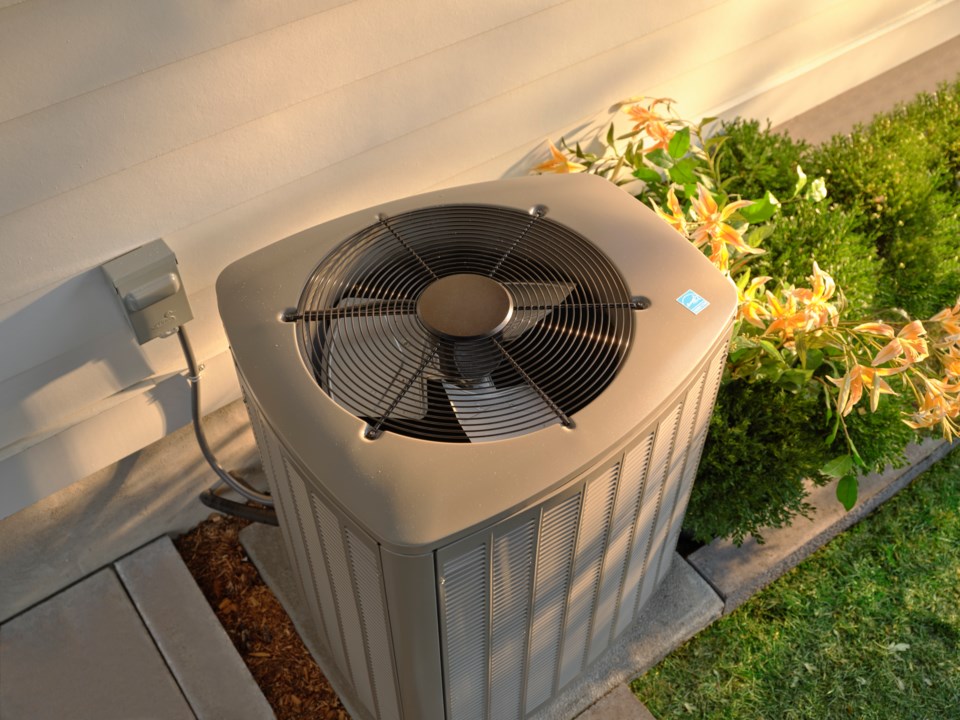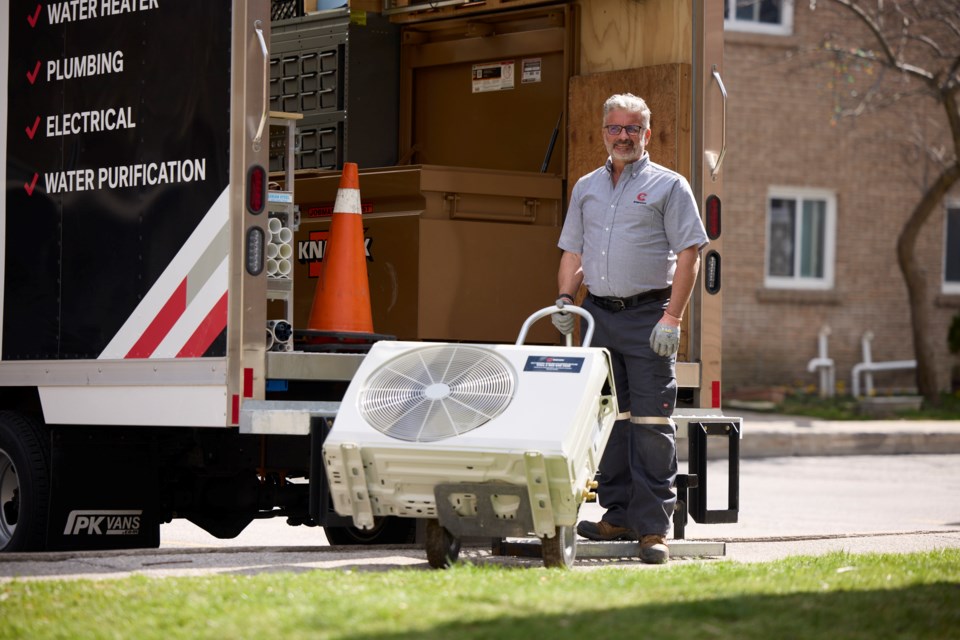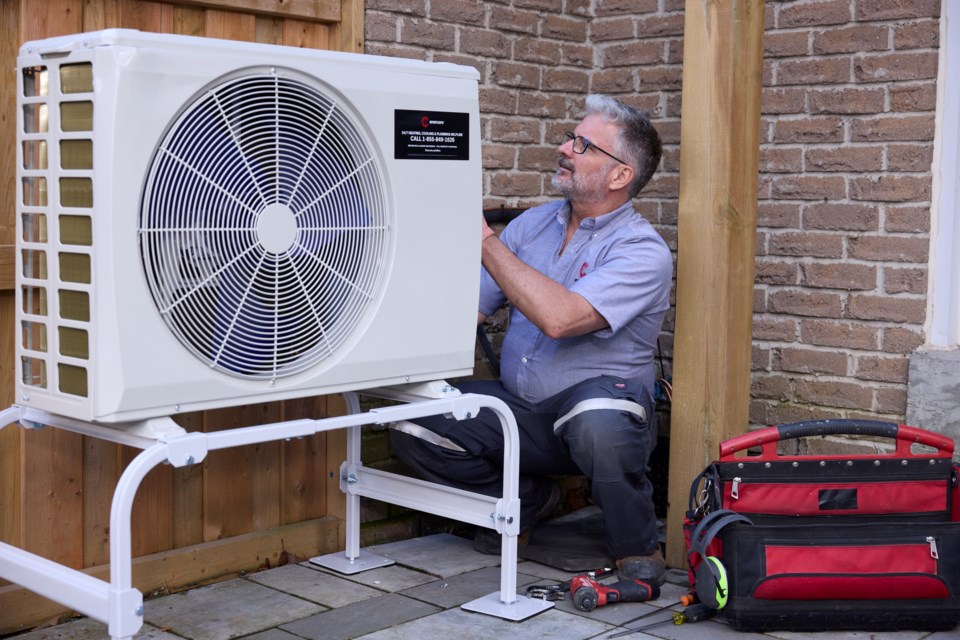Canadian homeowners are beginning to warm up—and cool down!—to the idea of home heat pumps.
That’s the news from Enercare product experts, as they help consumers ready their homes for both warmer and cooler months ahead.
Derek Brown, a senior technical product manager with Enercare, says the transition to heat pumps has been a growing trend across the country, and that by the end of the decade, single-purpose, standalone air conditioner units could be a thing of the past.
He attributes that to people becoming more cost-conscious—and environmentally conscious—when it comes to big investments for the home.
“For the most part, heat pump technology has evolved significantly over the past few years when it comes to efficiency,” Brown said. “Not just the heating side, but also the cooling side.”
Brown says the entry-level heat pumps he’s been working with begin at the 17 SEER rating and go up to the 25 SEER level, far above most current air conditioner models, which hover around the 14 SEER.
SEER ratings — Seasonal Energy Efficiency Ratio — are the industry standard for measuring how much energy cooling products like air conditioner units require to operate effectively over a single year. The higher the SEER rating, the more efficient the unit, Brown says.
HSPF ratings — Heating Season Performance Factor — is the heating efficiency rating for heat pumps. A heat pump with high SEER and HSPF ratings will generally consume less energy over the life of the equipment compared to units with lower SEER and HSPF rating.
Plus, the costs for units are becoming more in-line with what homeowners would like to spend.
"The costs of heat pumps are now really starting to align closer to what an AC has been traditionally,” Brown says. “So you can get this product that operates 10 to 12 months out of the year as opposed to two to four, for a little bit more of an investment than that four-month product."
And Brown adds that the heat pump systems they’re providing don’t take up as much room as they have in the past.
“Newer systems we’re seeing look similar to AC units, you probably wouldn’t be able to tell them apart, side-by-side,” Brown says.
What is a Heat Pump?
A heat pump is a device used for both heating and cooling homes. Unlike traditional air conditioners, which only cool, heat pumps can reverse their operation to provide heat during colder months. This dual functionality makes them an efficient choice for year-round climate control.
Heat pumps transfer heat from one place to another using refrigerant and electricity. In cooling mode, they remove heat from your home and release it outside. In heating mode, they extract heat from the outside air and bring it inside, even in cold temperatures. This process is energy-efficient as it moves heat rather than generating it through combustion.

Are Heat Pumps Better than ACs?
The big question from homeowners, Enercare Expert Consultant Daryl Knowles says, is which system is best?
“One of the biggest things we promote when talking about heat pumps is just how much you actually use the appliance,” Knowles says.
“One of the limitations with an air conditioner is that even in warmer places like southern Ontario, you may only be using it for four months of the year. Up in the northern parts of Ontario, you may only need the AC for a couple of months.”
But with a heat pump, Knowles says, the unit can operate year-round.
“In the summer, a heat pump works like an air conditioner,” Knowles says, “but in winter reverses the cycle of refrigeration, and then can provide heating.”
That’s good usage from a system that costs just a fraction more than traditional stand-alone AC units.
Knowles also ensures that his clients are aware of the environmental benefits of going with a heat pump.
“You are lowering your home's carbon footprint, which is a goal for every Canadian,” Knowles says.
“This is the environmentally-friendly way of heating your home without fossil fuel. You don’t have any natural gas emissions and off-gases.”
Do Heat Pumps Work Effectively in Deep Cold?
Knowles and Brown both emphasize that with the Canadian climate, homes that moved to a heat pump system still need a secondary heat source such as a gas-powered furnace.
During cold snaps, Enercare’s smart thermostat systems can easily switch over to heating with natural gas when needed, for the amount of time necessary to remain energy efficient and cost-effective.
“With heat pumps, the consumer gets to choose which utility they want to pay,” Knowles says. “You can pay the natural gas company during the colder times, and hydro for the rest of the year.”
What Size Heat Pump Do I Need?
The size of the heat pump you need depends on various factors, including the size of your home, insulation quality, and climate. It's crucial to have a professional assessment to determine the appropriate size, ensuring optimal efficiency and performance.
Knowles highlights the importance of expert design and installation.
"Having one of our experts come in and actually design the system so that it's the right size for your home is critical,” he says. “Proper installation ensures safety and efficiency."
"Your home might be the exact same as your neighbour's, but different factors like sun exposure and basement insulation can impact the sizing of equipment,” Brown adds. “Having a professional conduct a thorough analysis is key to setting yourself up for success."
Should I Rent or Purchase a Heat Pump?
Renting a heat pump can be a viable option if you're looking to avoid the upfront costs and prefer a hassle-free experience with maintenance included. Purchasing, on the other hand, can be more cost-effective in the long run, especially if you plan to stay in your home for many years. Enercare offers flexible options to suit different needs and budgets.
Enercare’s Expertise and Commitment to Affordable Sustainability
Enercare’s decades of experience empower customers to make smart choices in home services by providing holistic recommendations for efficient products and solutions at affordable prices. With a team of over 700 fully licensed, expert technicians, Enercare brings industry knowledge and expertise to every home visit.
For more details, you can check Enercare's blog post on this topic here.
To learn more about Enercare or connect with one of Enercare’s product specialists, visit www.enercare.ca, or call Enercare at 905-418-1032.

